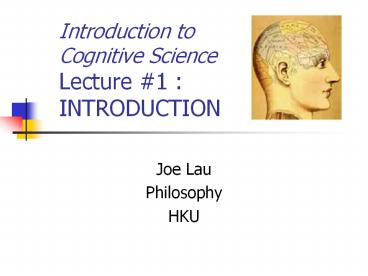Introduction to Cognitive Science Lecture - PowerPoint PPT Presentation
1 / 24
Title:
Introduction to Cognitive Science Lecture
Description:
From the mundane ... Perception, language, reasoning, action, ... To the abnormal and the bizarre ... Mundane reminder 'Tree' is a word, a representation. ... – PowerPoint PPT presentation
Number of Views:340
Avg rating:3.0/5.0
Title: Introduction to Cognitive Science Lecture
1
Introduction to Cognitive ScienceLecture 1
INTRODUCTION
- Joe Lau
- Philosophy
- HKU
2
What is CognitiveScience?
- An interdisciplinary science of mind and
behavior. - It is a science
- It studies mind and behavior
- It is interdisciplinary
- Cognitive science theories and explanations often
invoke computations and representations.
3
Mental Phenomena
- From the mundane ...
- Perception, language, reasoning, action, ...
- To the abnormal and the bizarre
- Cognitive impairments ( e.g. autism,
prosopagnosia, Cotard delusion, ) - and non-human species
- Animal cognition
4
Find your child ...
Cape Cross, Namibia
5
Why computation?
- Assumption 1
- Mental processes involve complex information
processing. - Assumption 2
- Complex information processing requires
computations. - Conclusion
- Computations are necessary for explaining mental
processes.
6
What is computation?
- Computation is (roughly) a rule-governed process
which manipulates representations. - We have strong evidence that the brain is capable
of carrying out massively parallel computations.
7
Mental representations
- MR objects or states in the brain which encode
information. - Dont confuse
TREE
8
Mundane reminder
- Tree is a word, a representation.
- It is a representation of a tree, a living thing,
not a representation of tree.
TREE
represents
9
Role of mental representations
- Information has to be physically encoded so that
they can be manipulated. - Memory / knowledge storing representations
- Thinking causal sequence of representations
- Two examples
10
Visual Perception
Topographical representation of visual stimulus
in area V1
11
(No Transcript)
12
Syntactic Disambiguation
- We shall discuss violence on TV.
- Two interpretations
13
Three Levels of Description
- Three (kinds of) levels in describing a
computational system - Task what the system is capable of doing
(capacities) - Algorithm (software) which computation
procedures are used - Implementation (hardware) how the computations
are implemented
14
Why Cogsci is Interdisciplinary
- Horizontal and vertical diversity in mental
capacities - The mind can carry out lots of different tasks in
different areas. - Each of these capacities can be studied at
different levels. - Cogsci and psychology
15
Relevance of cogsci
- Scientific understanding
- Education
- Psychiatry
- IT, AI
- Design of computer interface
- Voice recognition, data mining
- Cybernetics
16
(No Transcript)
17
Necessity and Sufficiency
- Computations might be a necessary part of most if
not all explanations of mental processes. - But computations themselves might not be
sufficient (enough) to explain all mental
processes. - Maybe some special features of the mind are due
to neuro-physiological properties. - Sleep? Hormonal effects?
18
Possibility of AI
- AI artificial intelligence
- Computations might still be sufficient for
mentality even if some aspects of the human mind
can only be explained neuro-physiologically.
19
Three Problems
- Philosophers three major concerns
- Intentionality
- Consciousness
- Freewill
20
Intentionality
- Intentionality aboutness, meaning, content
- Language, knowledge, reasoning, beliefs,
perception - The belief that 2gt1 is a belief about numbers.
- To be explained in terms of mental
representations.
21
Phenomenal Consciousness
- Feelings, sensations, experience
- Some mental states are both conscious and
intentional - e.g. conscious thinking
22
Freewill
- What is freewill?
- (A) Capable of making decisions (B) ???
- Presumably (A) can be explained computationally.
- What more is required?
23
Can computers do X?
- Computers cannot have emotions / creativity /
understanding / humour - To decide whether computers can have a mental
state X, we need to - Identify the conditions required for having X.
- Decide which of the conditions are easy /
difficult to be satisfied, and how.
24
Can computers be creative?
- What are the preconditions for creativity?
- Generating ideas and hypotheses
- Selecting and modifying the useful ones.
- Both cognitive / intentional processes
- No in-principle obstacles?































